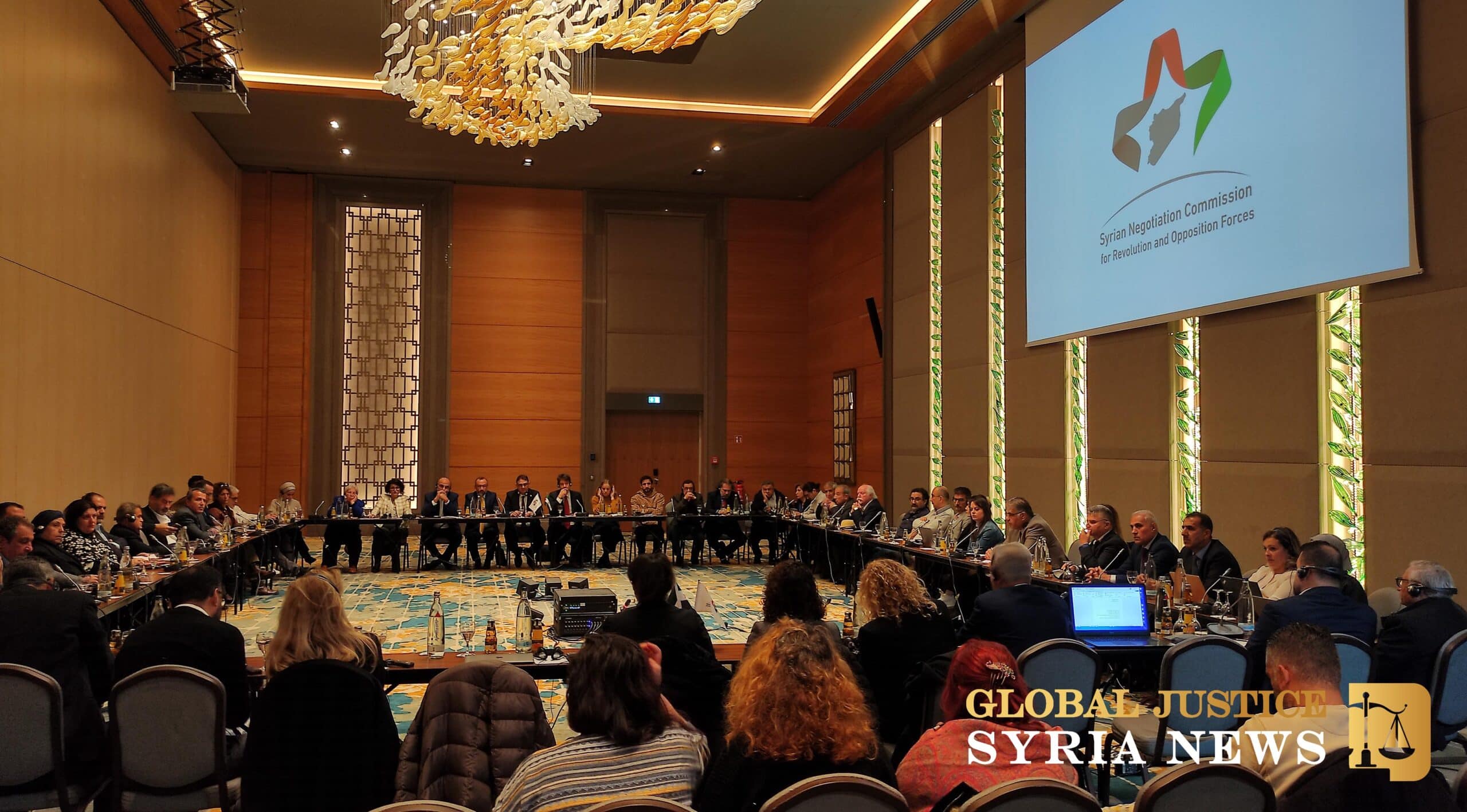Global Justice Syria News – Syrian News – Berlin:
During a consultative meeting organized by the Syrian Negotiation Commission with Syrian civil society in Berlin, Dr. Bader Jamous, head of the commission, and Vice President Jamal Suleiman reiterated that the Assad regime continues to reject a political solution and refuses to implement UN Resolution 2254 or any other international resolutions. They emphasized that the regime seeks to marginalize the Syrian opposition (the revolutionary and opposition forces) so that Syria remains represented solely by the Assad regime. Both Jamous and Suleiman highlighted Assad’s lack of belief in a political solution and his efforts to push his allies and lenient countries to undermine all political solutions, including Resolution 2254, the constitutional committee, and the Syrian Negotiation Commission.
Responding to accusations that the Syrian opposition, including the Negotiation Commission, is willing to make political concessions, Jamal Suleiman criticized the notion that the opposition is vying for a share of what some refer to as “Assad’s cake.” He stated it is shameful for anyone to think that the Syrian opposition is seeking ministries such as tourism or infrastructure within Bashar al-Assad’s government.
Suleiman discussed the desired cooperation between the Syrian opposition, represented by the Negotiation Commission, and civil society organizations. He acknowledged that some civil society groups harbor skepticism about the opposition’s intentions but emphasized the importance of reaching out to these organizations to coordinate positions and unite on common goals, rather than resorting to baseless accusations. He noted that after hundreds of thousands of martyrs, detainees, and millions of displaced Syrians worldwide, it is inappropriate to trivialize the situation by referring to it as a “cake.”
Suleiman also stressed that the current reality requires dealing with the facts without illusions but without leniency, while maintaining the Syrian cause and the demand for implementing Resolution 2254. He added that although the final solutions may not meet everyone’s expectations, it is crucial to strive for as many of their objectives as possible.
Alice Mufrej, a member of the Syrian Negotiation Commission, emphasized the importance of the commission’s efforts to build bridges with Syrian civil society over the past two years. She highlighted attempts to institutionalize relationships between the commission and civil society organizations, aiming for collaboration, shared visions, strategies, and goals while respecting each party’s independence. She stressed the need for free and constructive dialogue to work together toward common objectives, each utilizing its strengths to give Syrians a unified voice in pursuit of the Syrian cause and a political solution.
The Syrian Negotiation Commission had called for the consultative meeting with Syrian civil society organizations in Germany, represented by humanitarian and rights organizations, to strengthen the role of the Syrian lobby in Germany and to collaborate on keeping the Syrian issue at the forefront of discussions.
The meeting opened with a session with German envoy to Syria, Stefan Schneck, who affirmed that Germany stands with the Syrian opposition and remains committed to the “three no’s” regarding Syria: “No normalization with the Syrian regime,” “No lifting of sanctions,” and “No reconstruction until the regime commits to a political solution in accordance with UN Resolution 2254.” Schneck praised the Negotiation Commission’s efforts to enhance dialogue with Syrians, both inside the country and in the diaspora, as this approach would help narrow differences among Syrians and foster common solutions.
The consultative meeting in Berlin included various humanitarian and civil groups, including the Syrian Independence Alliance (SIA), the “Madaniyya” group, the “Caesar Families Association,” alongside Syrian legal professionals and specialists from different fields.
It is worth noting that the Syrian Independence Alliance (SIA) is a coordination and cooperation network extending from Syria to Turkey, Europe, and the United States. It was launched in early September, an initiative of the Syrian American Initiative, represented by Global Justice, the Syrian Emergency Task Force (SETF), the Civilization of the Euphrates Organization (HEUC) in the U.S., the Syrian Road to Freedom and My Justice World organizations in Turkey, the Damascus Studies and Development Organization, the Syrian National Bloc, and the Syrian National Movement, along with the Arab Democratic Alliance and several organizations providing legal and specialized professional support.



















